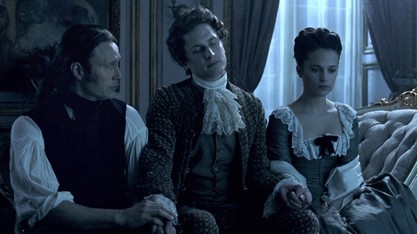While the royal Danes are cementing their antipathy towards each other, a German doctor is visiting a syphilitic noble. The doctor, Johann Friedrich Struensee (Mads Mikkelsen), is the atheist son of a prominent Lutheran minister, and therefore a possible entree back into high society for the out-of-favor count, Carl Ratzau (Thomas W. Gabrielsson). Ratzau arranges for Struensee to apply for the position of the king's personal doctor, and Struensee's talent for plain-speaking and his polite refusal to be intimidated by kingly power charms Christian. With a man of the Enlightenment now working closely with the king of a great nation, the potential for the foretold liberalization is now realized. The fly in the ointment is Struensee's and Caroline's mutual interest in Rousseau and Voltaire, which eventually turns into attraction, a scandal the court's conservative factions are happy to capitalize on.
Love triangle plots are no stranger to costume dramas, but A Royal Affair separates itself by putting the interloper at the center of attention. Caroline and Friedrich never have a rapprochement, befitting the ugliness of their relationship, so the tension within the three central characters come from the only thing the couple still has in common; their affection for Struensee. Friedrich enjoys having a partner in crime/manly influence/calming presence around, while the lonely Caroline desperately needs someone she can be honest with. Struensee is demonstrated to be deserving of all this affection, comfortable and charming in all scenarios, except the stultifying court games that both king and queen also despise.
A Royal Affair most succeeds in its depiction of the personal melting into the political. Struensee, and Caroline by extension, is able to manipulate the king into being an effective ruler, marginalizing conservatives, abolishing torture and censorship, and implementing practices of good government. By putting so many people out of power, however, Struensee's good works are immediately put at risk by his reckless personal life. The seeds of tragedy are intrinsic to the story, as the conservatives turn the happiness in Caroline's and Struensee's lives against them. They subvert the newly free press by funding their own newspapers that spread rumors of the queen's infidelity and alienate the Danes against the foreign Struensee, undermining his power and his relationship with the king. Even when promoted into a technocratic, enlightened dictator, Struensee still needs the support of a fickle king who can be talked into anything, and a people raised on a lifetime of credulousness that a couple years of liberalism cannot fully eliminate.
With a story so appealing, much of the actors' works is already done for them, but each of the central trio make each other better and compete strenuously for who steals the film. Vikander gets to display the fullest range of emotion, and never descends into cheese. The juvenile monarch Folsgaard portrays is always interesting, given to loud outbursts at the most inopportune times that add a layer of eye-catching unpredictability. Mikkelsen is one of my favorite actors and reminds me why I hold him in such high esteem with his Struensee, a man emboldened by his successes and cut deeply by his failures. A late scene of realization plays out on his face in heartbreaking fashion, as if all the hope of the Enlightenment is dying behind his eyes. Mikkelsen has now portrayed two Danish national heroes in Struensee and WWII resistance fighter Citronen, and he's as worthy a national avatar as any.
The mid to late 18th century is one of my favorite periods of European history, but the events depicted in A Royal Affair somehow missed my interest. A saga as dramatic as anything in the French Revolution was happening to the northeast, and several years before that earth-shattering event kicked off. Arcel's film tickles my intellectual sweet spot of changing political mores and loosening religious strangleholds in a nation in flux, while also adding in layered characters and conflicts. A Royal Affair is able to bring history to life, reminding the viewer that the so-called great men of history were just as blinkered as the men whose names no one knows. A-

 RSS Feed
RSS Feed